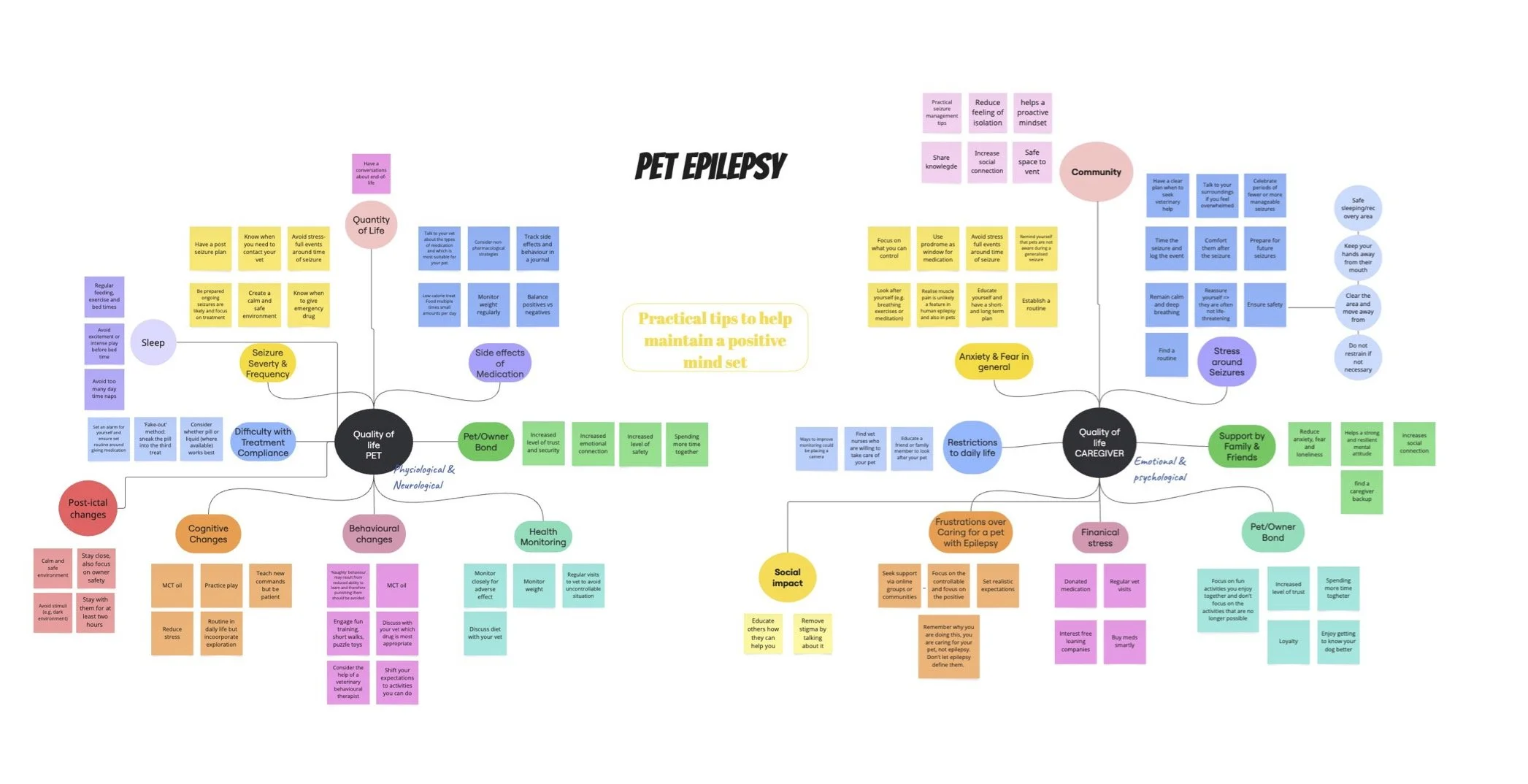Watch via YouTube to watch the full video
Evening Summary Created by AI
The meeting, led by Jos, a neurology clinician, focused on coping strategies, quality of life, and support networks for pets with seizures, particularly dogs with epilepsy. Discussions covered various aspects of managing epileptic pets, including medication, behavioral changes, and the impact on owners' lives, with participants sharing personal experiences and coping strategies. The session concluded with information on support networks, resources, and advice for pet owners dealing with epilepsy, emphasizing the importance of maintaining a positive mindset and seeking credible information.
Coping Strategies for Pets With Seizures
A discussion was led on coping strategies, quality of life, and support networks for pets with seizures. The session was interactive, encouraging participants to contribute and ask questions. The Seizure Clinic introduced Pauline, the epilepsy ambassador, who shared her experiences as a caregiver of an epileptic dog. Various topics were covered, including quality of life, coping strategies, training and behavioral management tips, financial strategies, and support networks. The session concluded with a mind map capturing the discussion points, which will be shared with participants.
Epilepsy's Impact on Pet Owners
We explored the concept of quality of life for pets, particularly dogs with epilepsy, and how it affects their owners. Since a dog's quality of life is largely based on the owner's perception, we discussed key factors like pain, eating, drinking, hygiene, happiness, and mobility. We also examined the impact of living with an epileptic pet on the owner’s well-being, including stress, anxiety, guilt, stigma, and lifestyle changes. The group shared challenges such as limited social life, sleep disturbances, and constant vigilance. We also acknowledged financial strain and highlighted the importance of support networks.
Epilepsy’s Impact on Pets and Owners
Our discussion focused on how seizure frequency, rather than severity, tends to affect pets' quality of life more significantly. We addressed medication side effects like drowsiness and behavioral changes, as well as the challenges of the postictal phase after a seizure. Participants shared coping strategies, including creating a safe environment and maintaining routines. We also explored behavioral changes in epileptic pets, such as increased anxiety and fearfulness, and emphasized the importance of acceptance, community support, and focusing on manageable aspects of care.
Epilepsy Management in Pets
We discussed epilepsy management in pets, particularly dogs and cats, and highlighted common seizure triggers like sleep, stress, and missed medication. Ongoing research into epilepsy watches to detect seizures for pets was mentioned, noting the difficulties in adapting human technology for animals. We stressed the importance of educating oneself about the condition, working closely with veterinarians, and staying calm during seizures. Key points included ensuring a safe home environment, having a backup caretaker, and prioritizing mental health. We reassured attendees that 70-80% of dogs with epilepsy can be well-controlled. The discussion also covered managing behavioral changes, keeping behavior diaries, and adjusting training expectations.
Seizure Management for Pets Discussion
During this session, we shared experiences with ocular compression and vagus nerve stimulator devices, noting that the research on ocular compression is minimal and outdated and may potentially work for some animals. We discussed emergency drugs like Diazepam and Midazolam, emphasizing administration based on seizure duration and frequency. Recognizing behavioral changes and adapting management strategies accordingly was also highlighted. We recommended practical approaches such as using blankets and ice packs and stressed the importance of patience and understanding. The discussion concluded with reflections on self-awareness and acceptance in managing pets with epilepsy.
Managing Seizures in Pets During Travel
We addressed the importance of preparing for seizures while traveling, including informing others about what to expect. Dietary approaches such as ketogenic diets and MCT oil for anxiety and ADHD-like behaviors were discussed. We also highlighted the need for better tools to measure the quality of life and behavior in pets with epilepsy. Personal experiences of adjusting travel plans due to seizures were shared, emphasizing the importance of emergency medication and proper care. Participants exchanged experiences on travel solutions, such as kennels and camper vans, to accommodate their pets’ needs.
Living With an Epileptic Dog
Yvonne shared her journey with her epileptic dog, Whisky, who has been managing the condition for five years. She spoke about the challenges of medication management, seizures, and the emotional toll on pet owners. She emphasized maintaining a positive mindset, being prepared, and cherishing the good moments. The deep bond between her and Whisky was highlighted, showing how living with an epileptic dog fosters appreciation for everyday moments. She encouraged pet owners to focus on providing a fulfilling life for their dogs, reminding them that they are still healthy dogs who happen to have epilepsy.
Support Networks for Epileptic Dogs
We provided an overview of support networks and resources for dog owners managing epilepsy. Useful websites were mentioned, along with budgeting tips such as discussing blood test frequency with vets, purchasing medications from online pet pharmacies, and checking insurance coverage for supplements. We emphasized the importance of discussing end-of-life decisions and setting realistic expectations. Jan shared his personal experience with her epileptic dog, Dougie, stressing the value of seeking support and not feeling alone. The discussion concluded with advice on navigating social media and online resources, emphasizing the need for credible sources and vet consultations before making decisions.
